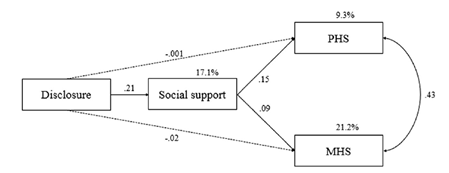“The association between HIV disclosure to family members and quality of life among people living with HIV/AIDS: The indirect effects through social support" was published in Current Psychology by Dr Guangyu Zhou's group. The current study was one of the first efforts demonstrating the direct effect of HIV disclosure to family members on health-related quality of life (H-QoL) among people live with HIV (PLWH) and the potential mediating role of social support.
HIV/AIDS infection has significant negative effects on the mental and physical health of infected individuals. Improving health-related quality of life can help infected individuals better cope with their disease. HIV disclosure was assumed an essential step for PLWH to create an opportunity of receiving social support from significant others. Besides, as a coping strategy, acquiring social support was an essential buffer against the negative impact of disclosure concern on H-QoL outcomes. However, existing studies have yielded inconsistent findings on the relationship between HIV disclosure and physical/mental H-QoL. Also, little is known about the mechanisms influencing HIV disclosure in specific relationships (e.g., to family members).

This study used a cross-sectional design in a Guangxi sample (1104 participants were included). The study found that HIV disclosure to family members did not have a significant effect on H-QoL of PLWH, but social support played a mediating role in this process. For PLWH, family members are often the first to learn their seropositive status. In such cases, the pathway depicted by the current study proposed a potential possibility that disclosing seropositive status to family members might elicit better social support from the recipients and, in turn, could improve physical/mental H-QoL. HIV disclosure to family members could be a double-edged sword. Although direct disclosure may not have a positive impact on health-related quality of life, given the outweighed potential benefits in both individual and interpersonal levels, the process of sharing seropositive status with family members could still be considered as an overall helpful behavior. Supported by the findings, future interventions targeting PLWH’s H-QoL might consider adding elements of disclosure management, including communication skills training that are likely to elicit social support or inviting patients’ family members to participate in the interventions.
This study contributes to the understanding of the relationship and impact pathways between HIV disclosure and H-QoL among PLWH, as well as provides empirical evidence for the development of effective interventions to improve H-QoL for PLWH.
The study was conducted in collaboration between the School of Psychological and Cognitive Sciences of Peking University, the University of South Carolina, and Guangxi Center for Disease Control and Prevention. The research was supported by National Institutes of Health (NIH), National Nature Science Foundation of China (NSFC) and National Clinical Research Center for Mental Disorders (Peking University Sixth Hospital).
Mi, T., Li, X., Zhou, G., Qiao, S., Shen, Z., Zhou, Y. (in press) The association between HIV disclosure to family members and quality of life among people living with HIV/AIDS: A potential mediating role of social support. Current Psychology. https://doi.org/10.1007/s12144-021-01927-w


